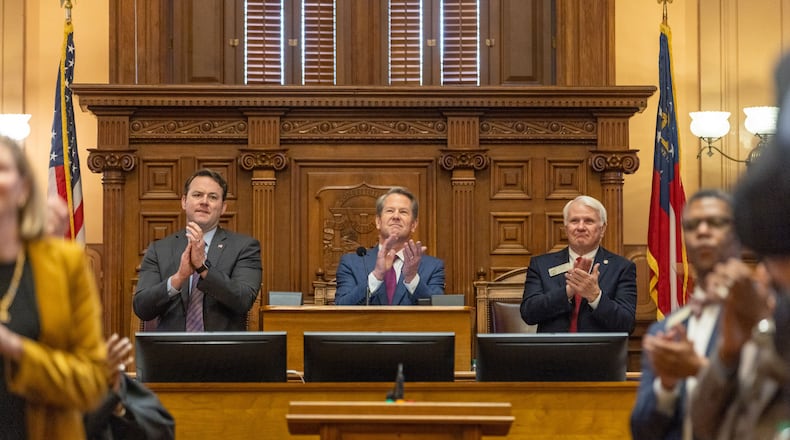Gov. Brian Kemp and Republican legislative leaders unveiled a plan Tuesday to dip into the state’s bulging surplus to refund more than $1 billion to Georgians when they file their taxes next year.
Under the proposal, Georgians would be able to receive a maximum income tax refund of $250 for single residents, $375 for those filing as heads of households and $500 for married couples filing jointly based on their 2023 earnings.
It would amount to more than $6.6 billion in tax cuts or refunds signed into law by Kemp since he took office in 2019. That includes a similar $1.1 billion refund issued in 2022 during the Republican’s reelection campaign that repaid many Georgians up to $500 when they filed their taxes.
The measure announced Tuesday must first pass the GOP-controlled Legislature, which convenes in January. But with the blessing of House Speaker Jon Burns and Lt. Gov. Burt Jones — both of whom flanked Kemp at a Capitol news conference — a revolt against the idea seems unlikely.
“This isn’t the government’s money, it’s yours. That money belongs to hardworking Georgians,” said Kemp, who cast the rebates as a fight against “bad policies coming out of Washington” in the heat of a close presidential race between Vice President Kamala Harris and former President Donald Trump.
“While we can’t fix everything they’ve broken,” Kemp said, “our hope is the measure we’re announcing today will help in some way.”
With four straight years of surpluses, state records show Georgia has roughly $11 billion of unallocated surplus cash along with a $5.5 billion rainy day fund. There’s also more than $2.4 billion in Georgia’s lottery reserve fund.
The extra cash has fueled pressure on Kemp to use the financial cushion in other ways. Anti-tax advocates want Kemp and other legislative leaders to make deeper cuts to income taxes or finance heftier refunds.
Credit: arvin.temkar@ajc.com
Credit: arvin.temkar@ajc.com
And Democrats have called on the governor to dip into the surplus for more sweeping state-funded programs, starting with an expansion of the Medicaid program, which Kemp and other leaders have said is too costly and inflexible to adopt in the long run.
Some also press for more ambitious — and costly — spending that ranges from larger pay hikes for teachers and other state employees to new infrastructure projects.
State Rep. David Wilkerson, D-Powder Springs, said the growing surplus was a credit to the policies promoted by President Joe Biden and Harris, including an injection to the state’s coffers through massive federal spending during recovery from the COVID-19 pandemic.
“As someone who has always supported and voted for returning money to Georgians through fair tax policy, I look forward to seeing the details,” he said.
Credit: Natrice Miller / Natrice.Miller@ajc.com
Credit: Natrice Miller / Natrice.Miller@ajc.com
Kemp’s refund proposal comes as state tax collections are slowing amid record state spending, including a raft of once-in-a-lifetime projects approved this year that usually take lawmakers years to finance.
Capitol Hill is getting a glitzy renovation, the University of Georgia was rewarded with a long-sought medical school and dozens of rural communities are receiving cash for airports, water and sewer projects, and new road networks.
Even so, Georgia’s surplus is still on the rise. That’s because Kemp has consistently underestimated how much tax revenue the state collects, limiting lawmakers from appropriating it. That means the state’s coffers still swelled even when tax collections dip.
In fact, the state didn’t need to spend $2 billion in surplus to fund all those projects included in a record midyear budget since the revenue eclipsed the state’s rather dim financial projection.
Republicans say the governor’s conservative approach has put the state on financial footing and helped avoid what happened to then-Gov. Sonny Perdue during the 2000s, when two recessions forced billions of dollars in spending cuts and reductions in state services.
Democrats say Kemp lowballs the state’s revenue estimates at the expense of relatively small-ticket items, such as a Medicaid expansion advocates say would ultimately save Georgia more money than the roughly $300 million it would cost, because it isn’t in the GOP political playbook.
Democratic state Rep. Michelle Au, a Johns Creek physician, is one of her party’s most vocal supporters of Medicaid expansion. She said investing in the program would provide long-term benefits.
“A sound investment of our tax dollars would be to lower the state’s high number of patients without health insurance, as many uninsured families are just one health emergency away from financial ruin,” Au said.
Credit: TNS
Credit: TNS
The refund proposed by Kemp might not be the last time the governor dips into the surplus in the coming year. He’s called for additional state income tax cuts and could seek to finance heftier pay hikes for state employees and new infrastructure improvements.
And he said the state is exploring plans to provide relief for victims of Hurricane Helene even as federal lawmakers start what could be a long, fraught fight for recovery aid for the storm, which exacted an estimated $6 billion toll on the agricultural and timber industry.
Burns, the House’s top lawmaker, said legislators would help provide relief for the “generational damage” many Georgia farmers suffered. And Kemp said his office has begun to dig into “ideas that we’re hearing from people on the ground.”
“I can assure you, we’ll move quickly during the first part of the legislative session on storm packages.”
Credit: TNS
Credit: TNS
About the Author






